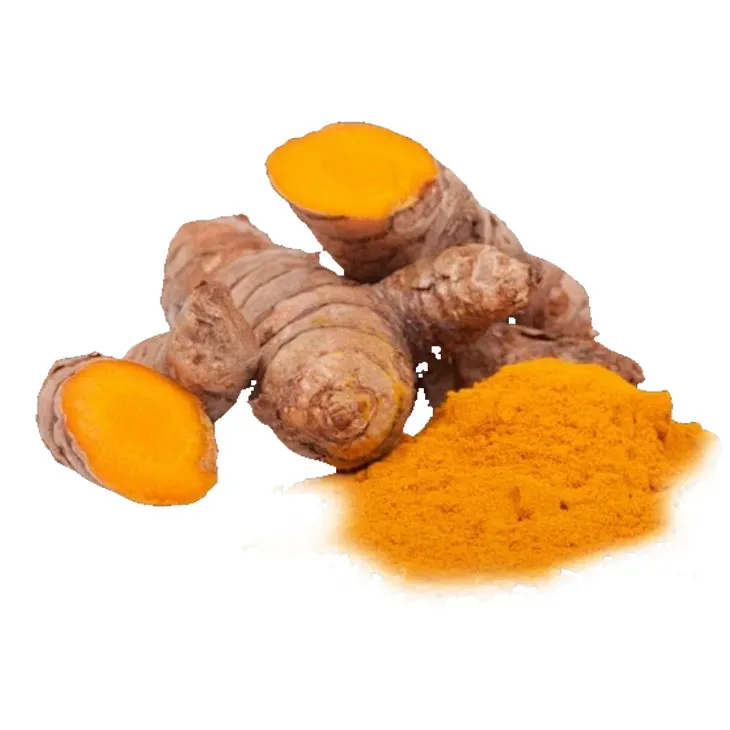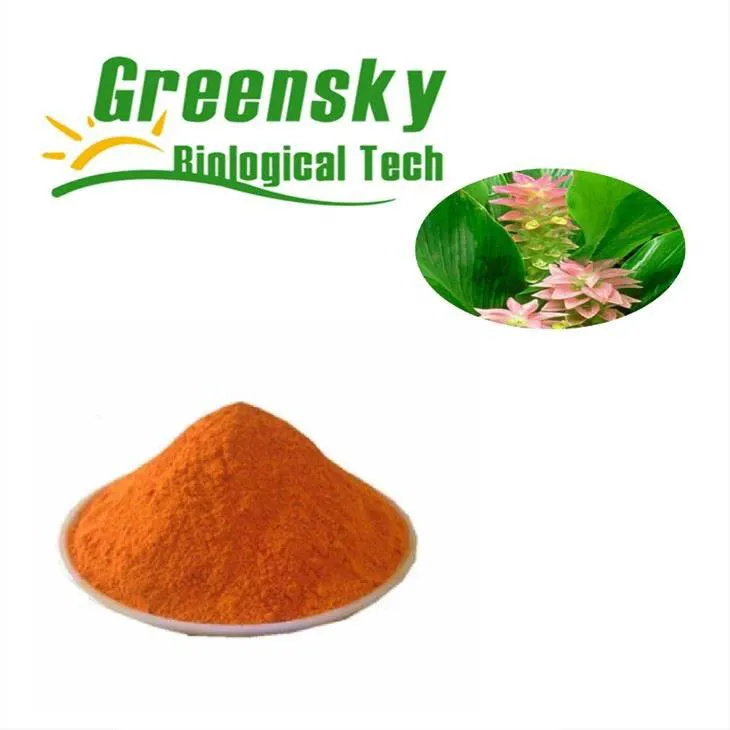- 0086-571-85302990
- sales@greenskybio.com
100% Pure Natural Curcumin.
2024-12-01

Introduction to Curcumin
Curcumin, a 100% natural compound, has been making waves in the world of health and nutrition. It is derived from the rhizome of the turmeric plant (Curcuma longa), which has been used for centuries in traditional medicine, particularly in Asian cultures. This bright yellow pigment is not only responsible for the characteristic color of turmeric but also holds a plethora of health - promoting properties.

Antioxidant Properties of Curcumin
One of the most significant aspects of curcumin is its antioxidant nature. In the body, oxidative stress occurs when there is an imbalance between the production of free radicals and the body's ability to neutralize them. Free radicals are highly reactive molecules that can damage cells, proteins, and DNA, leading to various health problems such as premature aging, heart disease, and cancer.
Curcumin acts as a powerful antioxidant by donating electrons to free radicals, thereby neutralizing their reactivity. This helps in combating oxidative stress and protecting the body's cells from damage. Studies have shown that curcumin is more effective than some well - known antioxidants like vitamin E in scavenging certain types of free radicals.

Anti - Inflammatory Benefits
Inflammation is the body's natural response to injury or infection. However, chronic inflammation can be a root cause of many diseases, including arthritis, diabetes, and cardiovascular diseases. Curcumin's anti - inflammatory characteristics are of great value in this regard.
It works by inhibiting various inflammatory pathways in the body. For example, it can suppress the production of pro - inflammatory cytokines, which are signaling molecules that promote inflammation. In people suffering from chronic pain related to inflammation, curcumin has shown promising results in reducing pain and improving joint function. In the case of rheumatoid arthritis, curcumin has been found to be as effective as some non - steroidal anti - inflammatory drugs (NSAIDs) in alleviating symptoms, but with potentially fewer side effects.

Curcumin and Skin Health
The potential of curcumin in promoting healthy skin is also being actively explored. The skin is constantly exposed to environmental stressors such as UV radiation, pollution, and toxins, which can lead to oxidative damage and premature aging.
Curcumin can help protect the skin from these harmful effects due to its antioxidant and anti - inflammatory properties. It may also play a role in reducing acne and other skin inflammations. Some skincare products are now incorporating curcumin as an active ingredient, and initial studies suggest that it can improve skin texture, reduce wrinkles, and enhance the overall appearance of the skin.

Curcumin's Role in Preventing Neurodegenerative Diseases
Neurodegenerative diseases, such as Alzheimer's and Parkinson's, are becoming increasingly prevalent as the population ages. Curcumin is being investigated for its possible role in preventing neurodegenerative diseases.
It has been shown to have several mechanisms of action that could be beneficial in this context. For instance, curcumin can cross the blood - brain barrier and has anti - amyloidogenic properties. In Alzheimer's disease, the accumulation of amyloid - beta plaques in the brain is a key pathological feature. Curcumin can inhibit the formation of these plaques and also reduce the associated inflammation in the brain. Additionally, it may protect neurons from oxidative damage and promote neuronal survival, which could potentially slow down the progression of neurodegenerative diseases.

How to Incorporate Curcumin into Your Diet
There are several ways to include curcumin in your diet to reap its health benefits:
1. Turmeric in Cooking
The simplest way is to use turmeric, which contains curcumin, in cooking. Turmeric can be added to curries, soups, stir - fries, and even smoothies. However, it should be noted that the bioavailability of curcumin from turmeric is relatively low. To enhance its absorption, it is often recommended to consume turmeric with black pepper, as piperine in black pepper can increase the bioavailability of curcumin.
2. Curcumin Supplements
Another option is to take curcumin supplements. These are available in various forms, such as capsules, tablets, and powders. When choosing a supplement, it is important to look for high - quality products that are standardized to contain a certain percentage of curcuminoids (the active compounds in curcumin). However, it is always advisable to consult a healthcare professional before starting any new supplement regimen.
Conclusion
In conclusion, 100% pure natural curcumin is truly nature's gift to health. Its antioxidant, anti - inflammatory, skin - health - promoting, and potential neurodegenerative - disease - preventing properties make it a multi - faceted compound with great potential in improving overall health. Whether through dietary sources or supplements, incorporating curcumin into your daily routine can be a step towards a healthier life.
FAQ:
What are the main health benefits of 100% pure curcumin?
100% pure curcumin has several main health benefits. Firstly, as an antioxidant, it is effective in fighting oxidative stress. Secondly, its anti - inflammatory properties are good for people with chronic pain or inflammation - related diseases. It is also being studied for promoting healthy skin and potentially preventing neurodegenerative diseases.
How does curcumin combat oxidative stress?
Curcumin combats oxidative stress because of its antioxidant nature. Antioxidants are substances that can prevent or slow damage to cells caused by free radicals, which are unstable molecules that the body produces as a result of normal metabolism. Curcumin can neutralize these free radicals, thus reducing oxidative stress.
Can curcumin really help with chronic pain?
Yes, it can. Due to its anti - inflammatory characteristics, curcumin can play a role in alleviating chronic pain. Inflammation is often associated with chronic pain, and by reducing inflammation, curcumin may help to relieve the associated pain symptoms.
What is the role of curcumin in promoting healthy skin?
The exact role of curcumin in promoting healthy skin is still being explored. However, it is thought that its antioxidant and anti - inflammatory properties may contribute to skin health. For example, it may help to protect the skin from damage caused by environmental factors such as UV radiation and pollution, and may also play a role in reducing skin inflammation.
How is curcumin studied for preventing neurodegenerative diseases?
Researchers are studying curcumin for preventing neurodegenerative diseases in various ways. They may conduct in - vitro experiments using cell cultures to observe the effects of curcumin on nerve cells. Animal models are also commonly used to study how curcumin affects the development and progression of neurodegenerative diseases in living organisms. Additionally, some epidemiological studies may be carried out to look at the relationship between curcumin intake and the incidence of neurodegenerative diseases in human populations.
Related literature
- The Antioxidant and Anti - Inflammatory Properties of Curcumin: A Review of Preclinical and Clinical Research"
- "Curcumin: A Promising Nutraceutical for Skin Health"
- "Curcumin and Neurodegenerative Diseases: A Review of the Current Evidence"
- ▶ Hesperidin
- ▶ citrus bioflavonoids
- ▶ plant extract
- ▶ lycopene
- ▶ Diosmin
- ▶ Grape seed extract
- ▶ Sea buckthorn Juice Powder
- ▶ Beetroot powder
- ▶ Hops Extract
- ▶ Artichoke Extract
- ▶ Reishi mushroom extract
- ▶ Astaxanthin
- ▶ Green Tea Extract
- ▶ Curcumin Extract
- ▶ Horse Chestnut Extract
- ▶ Other Problems
- ▶ Boswellia Serrata Extract
- ▶ Resveratrol Extract
- ▶ Marigold Extract
- ▶ Grape Leaf Extract
- ▶ blog3
- ▶ blog4
-
Active ingredients in sugarcane extracts.
2024-12-01
-
Epimedium extract powder
2024-12-01
-
Centella Asiatica Extract
2024-12-01
-
Pine bark Extract Powder
2024-12-01
-
Thunder God Vine Extract
2024-12-01
-
Horse Chestnut Extract
2024-12-01
-
American Ginseng Root Extract
2024-12-01
-
Astaxanthin
2024-12-01
-
Beetroot Powder
2024-12-01
-
Yohimbine Bark Extract
2024-12-01
-
Panax Ginseng Leaf Extract
2024-12-01





















